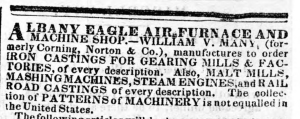 From an 1839 edition of the Albany Argus, an advertisement from the Albany Eagle Air Furnace and Machine Shop, where William V. Many (formerly of Corning, Norton & Co.) manufactured just about everything that could be made of iron. We won’t try to replicate their emphatic use of capital letters in telling you that they manufactured to order
From an 1839 edition of the Albany Argus, an advertisement from the Albany Eagle Air Furnace and Machine Shop, where William V. Many (formerly of Corning, Norton & Co.) manufactured just about everything that could be made of iron. We won’t try to replicate their emphatic use of capital letters in telling you that they manufactured to order
Iron castings for gearing mills & factories, of every description. Also, malt mills, mashing machines, steam engines, and railroad castings of every description. The collection of patterns of machinery is not equalled in the United States.
The following articles will be kept constantly for sale at the Furnace, and furnished at short notice, viz: potash kettles, single and double bottoms, from 56 to 140 gallons, cauldrons from 1 to 3 barrels, hatters’ and soap boilers’ kettles, bark mills, paper mill and other screws, press plates, oven mouths and furnace doors, hand-pumps , single and double forcing pumps, wagon, cart and post coach boxes, sash weights, 7, 14, 25, 28 30, 50, 56, and 60 lb. weights, forge hammers, sleigh shoes, stoves, hall scrapers, portable furnaces, hawser irons, mandrills for coppersmiths, bookbinders’ and notarial or seal presses.
There was also a extensive assortment of plough patterns “embracing almost every kind in use, and the company offered pig iron, fire brick, coal, amboy sand and clay to “country founders.”
Orders could be addressed to Mr. Many at No. 84 Beaver street, Albany, “or to the care of Messrs. Erastus Corning & Co.”
 In this advertisement, it wasn’t mentioned that the Eagle Air Furnace was also known as a temperance furnace. “Not a drop of strong drink of any description is furnished to the men or permitted to be used in the furnace, and but few of the men are in the habit of drinking at all out of the furnace, and these few but very little.” We’ve written about the Eagle Air Furnace before. The Corning connection is interesting, but Erastus Corning appears to have been no more than an agent for William Many. According to Irene Neu’s “Erastus Corning: Merchant and Financier, 1794-1872,” Corning had been employed by the previous owner of the foundry, John Spencer, as early as 1814, and he bought a partnership in Spencer’s company in 1816. Then the firm Corning and Norton was sole owner by 1825, but it was apparently not successful and he sold it to William V. Many, a Corning and Norton employee, and Robert E. Ward, but remained a merchandising agent for the firm.
In this advertisement, it wasn’t mentioned that the Eagle Air Furnace was also known as a temperance furnace. “Not a drop of strong drink of any description is furnished to the men or permitted to be used in the furnace, and but few of the men are in the habit of drinking at all out of the furnace, and these few but very little.” We’ve written about the Eagle Air Furnace before. The Corning connection is interesting, but Erastus Corning appears to have been no more than an agent for William Many. According to Irene Neu’s “Erastus Corning: Merchant and Financier, 1794-1872,” Corning had been employed by the previous owner of the foundry, John Spencer, as early as 1814, and he bought a partnership in Spencer’s company in 1816. Then the firm Corning and Norton was sole owner by 1825, but it was apparently not successful and he sold it to William V. Many, a Corning and Norton employee, and Robert E. Ward, but remained a merchandising agent for the firm.
